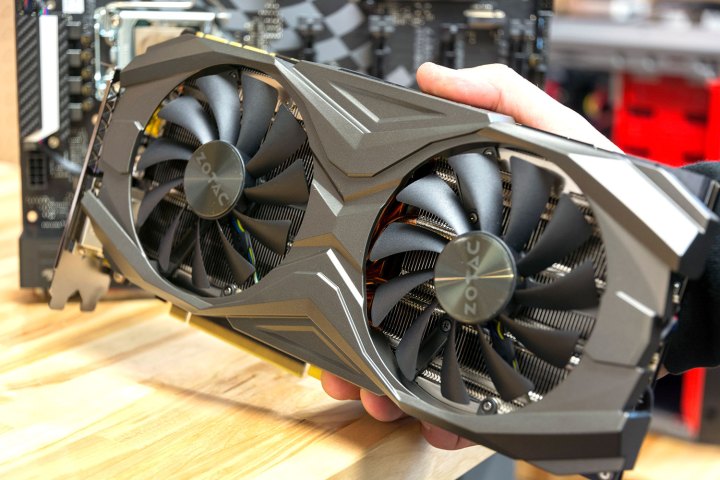
A leaked email purportedly written by a Nvidia graphics card partner for a retailer provides the release dates of the upcoming GeForce GTX 11 Series. The letter also seems to confirm rumors we’ve heard over the last several months: That Nvidia pushed back the launch due to an abundance of unsold GTX 10 Series stock currently on the market. Of course, the letter could be 100 percent fake, so let’s tread carefully with this info.
“We have an overstock of 10xx GPUs and we’re in the middle of transitioning our manufacturing over from the 10xx to the 11xx series in preparation for releasing the new cards,” the letter states.” However, because we and other partners and manufacturers have an abundance of unfinished or unsold 10xx GPUs, Nvidia decided to have us delay the release of the 11xx cards.”
Here is the supposed new release schedule. Since product availability is usually a few weeks after a formal reveal/launch, the schedule confirms rumors that Nvidia will introduce the new family – or the GTX 1180 at the least – at a special event just prior to or during the Gamescom convention in Germany that starts August 22.
- August 30, 2018: GTX 1180
- September 30, 2018: GTX 1170 and GTX 1180+
- October 30, 2018: GTX 1160
What’s interesting here is the GTX 1180+, an entirely new branding and likely not another name for a GTX 1180 Ti. Could this be a rebranding of the Founders Edition, or will this be an enhanced card with higher clock speeds for a higher price? Maybe the “plus” refers to additional onboard memory?
The letter also notes that the graphics card partner will conduct a conference call for retailers on August 21, 2018, indicating that the GTX 11 Series nondisclosure agreement will already be lifted by that time.
In addition to the leaked email, the GTX 1170 reportedly appeared on a recent benchmark, showing it to be faster than the $700 GTX 1080 Ti. According to the benchmark, the card will run at around 2.5GHz and include 16GB of GDDR6 memory running on a 256-bit memory interface. It scored an alleged 29,752 graphics points in the 3DMark FireStrike benchmark, surpassing the GTX 1080 Ti’s 28,391 score and the Radeon RX Vega 64’s 22,931 score.
But like the email, this benchmark could be 100 percent bogus. For starters, the information stems from a photograph taken of the benchmark, and not from an actual screenshot. The benchmark also isn’t listed in 3DMark’s online database, nor does it sport the Nvidia “generic VGA” entry typically seen in early benchmark leaks. There’s no way to correctly identify the card prior to its official release,” which is why you would see the “generic VGA” label instead.
All new GTX 11 Series cards will likely be based on Nvidia’s new “Turing” architecture and 12nm process technology rather than the Volta design used in the $3,000 Titan V add-in card. In the case of Nvidia’s GTX 1170, cards will be based on the GT104 chip packing around 2,688 CUDA cores with a base speed of around 1.5GHz and a maximum speed of around 1.8GHz. The power draw is expected to be between 140 watts and 160 watts.



